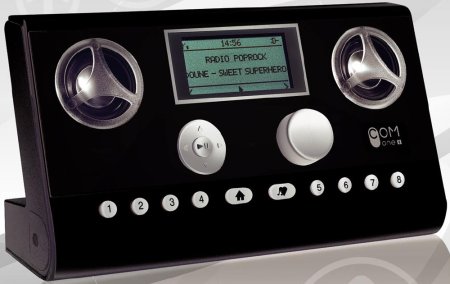Device Profile: Com One Phoenix IP Radio
Feb 15, 2007 — by LinuxDevices Staff — from the LinuxDevices Archive — 5 views French bluetooth accessory specialist Com One is readying a portable WiFi clock-radio powered by a 2.6.15-7 kernel and the Familiar Linux distribution. The battery-powered “Phoenix IP Radio” is based on an Intel PXA270 (Bulverde) processor, and goes on sale direct to consumers next month.
French bluetooth accessory specialist Com One is readying a portable WiFi clock-radio powered by a 2.6.15-7 kernel and the Familiar Linux distribution. The battery-powered “Phoenix IP Radio” is based on an Intel PXA270 (Bulverde) processor, and goes on sale direct to consumers next month.
digg this story |
The Phoenix can receive and play media from HTTP-based Internet radio stream protocols that include ICEcast/SHOUTcast and Microsoft Media Streaming Protocol (MSP). Additionally, the device can render audio content stored on attached USB storage devices and portable media players.

Com One Phoenix IP Radio
(Click to enlarge)
Supported playlist formats include standard M3U and PLS, as well as Microsoft's ASX format. Additionally, the radio can handle RSS feeds, such as those associated with podcasts. Supported audio file formats include WMA-8 and -9, and MP3, at bitrates up to 320Kbps. Uncompressed WAV files up to DAT (48kHz) quality are also supported.
Previously, the device was marketed primarily to network service providers such as Orange, a large French mobile phone carrier and Internet service provider, which resold a white version of the device as the “Orange LiveRadio.” Now, Com One (also known as “Baracoda”) is establishing a retail channel for the device in North America, and also plans to sell direct to consumers via the Internet, starting in March, according to MARCOM specialist Marcia Simon.
Com One is best known for Bluetooth accessories such as headphones and wireless speakers. The Phoenix IP Radio, which has a WEP/WPA-capable 802.11b/g WiFi transceiver, is the company's first WiFi product, according to Simon. “The direction the consumer market is going, it just made sense to branch out into WiFi,” she said, adding that the Phoenix does support USB Bluetooth adapters, and that a future model will have Bluetooth built in.
Thanks to its legacy as CPE (customer premises equipment), the Phoenix has several features aimed at integration with service and management platforms. These features may or may not be present in the consumer model. They include browser-based user customization, over-the-air firmware updates, integration with indexing/sales services for audio book, podcasts, and Internet streams. Additionally, the can be integrated with billing and customer relationship management services.
What's under the hood?
The Phoenix radio is based on an Intel PXA270 processor clocked at 300MHz. It boots Linux from 8MB of Flash, and has 32MB of RAM. As noted, the device offers two I/O interfaces — 802.11b/g, and a USB host port supporting USB mass storage devices and USB Bluetooth transceivers. Plus it has a 128×64 pixel monochromatic LCD screen.
The device's audio subsystem includes a dual 2 Watt stereo amplifier, and a pair of 1.6-inch (4cm), 8-ohm speakers rated to 4 Watts (RMS) each. The unit also has an 1/8th-inch (3.5mm) stereo mini jack. Audio system bandwidth is claimed to be 170Hz to 20kHz, an impressive range for such a small, low-powered device.
Hardware controls include eight preset keys, a 5-way navigation pad, a selection key, a home key, and a volume knob.
The Phoenix is powered by and supplied with four rechargeable (NiMH) AA batteries, and also comes with a region-specific power adapter/recharger. It measures 8.7 x 4.8 x 3 inches (220 x 123 x 78mm), and weighs 1 pound, 4.5 ounces (0.6kg) with batteries.
Why Linux?
CTO and co-founder Olivier Giroud said his company chose Linux for its “open environment” and for its “many available open-source libraries.” The company's internal staff were able to build the Phoenix's Linux-based operating system without outside assistance, he said.
Asked about the challenges of developing embedded products with Linux, Giroud stated, “The code is not small enough. It has to be optimized.”
Availability
Com One expects to begin accepting orders for the Phoenix IP Radio in March, for delivery in April. Suggested retail for the device is $250.
This article was originally published on LinuxDevices.com and has been donated to the open source community by QuinStreet Inc. Please visit LinuxToday.com for up-to-date news and articles about Linux and open source.